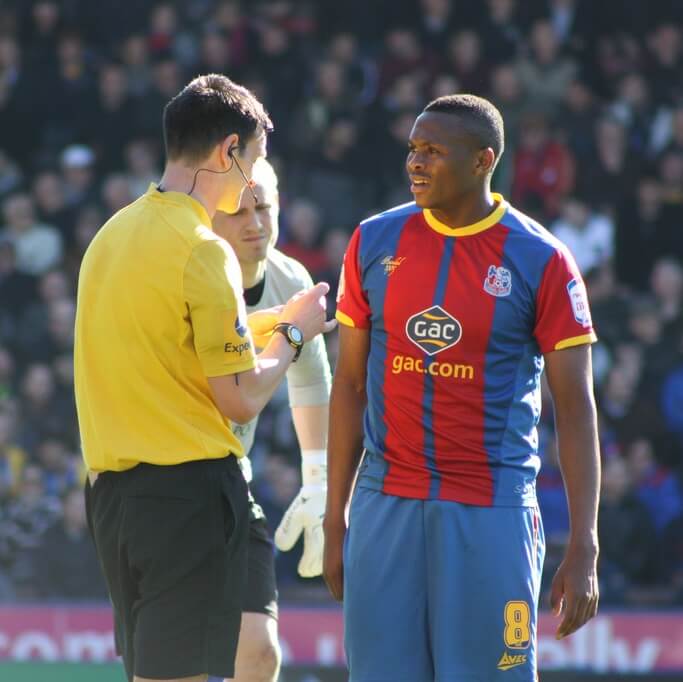An overview of the role
The role of a referee is to oversee a football match and ensure that players adhere to the rules of the sport, preserving the integrity of the sport. There are referees at all levels of skill, from local amateur games to international competitions.
Until recently even premier league refereeing was a part-time job, with even the most professional referees in the industry working other careers 9-5. The tide has started to turn, however, and now it is possible to become a full-time referee
What are the responsibilities of a referee?
The responsibilities of a referee include:
- Watching the play closely and make decisions based on their observations
- Communicating with players, coaches, managers, officials and other staff
- Inspecting the pitch before the match begins, checking markings and equipment are all in order
- Ensuring that they have all necessary equipment for refereeing, which may include cards, stopwatches and even radio communications at premier league level
- Instructing, directing and communicating with the assistant referees, if any
- At high level and important games, such as premier league, writing detailed match reports on any notable incidents that happened during play

Referees need to be able to defuse situations that become tense and understand that if there is a brawl you don’t throw yourself into the middle. You stand back and use your cards if you have to
Keith Gibson, Football Referee 1
What are the key skills required by a referee?
The FA National Referee Strategy defines an excellent football referee as one who possesses the following characteristics:
- Respect
- Empathy
- Fitness
- Evaluation
- Reliability
- Education
- Excellence
Other key skills for a referee include:
- A passion for the game
- Excellent observational skills
- Excellent communication skills
- The ability to make decisions under pressure
- The ability to remain professional and calm even in highly emotional situations
The FA draw attention to fitness as an important part of refereeing. The higher the level at which the referee plays, the greater the need for them to be physically fit. Especially important is good running technique; a referee should be fast with good stamina. The FA provide an extensive guide on referee fitness, including suitable training exercises and the tests that referees of certain ages and skill levels should be able to pass.
What qualifications does a referee require?
The qualifications
In order to apply to become a referee in the UK, you must be a UK citizen of at least 14 years old. This enables you to undertake the FA Referees Course, which is a mostly practical course designed to provide all the skills necessary to referee a game. Aspiring referees normally take the course at their local county FA for the cost of £165.
Once you have passed the basic course you will be classed as a Level 7 ref, allowed to referee matches up to amateur league standard. Then you
Do I need relevant work experience to become a referee?
There are nine levels at which a referee is qualified to
Once a referee has passed the basic qualification, promotion depends entirely on experience and talent
- Level 1 – National List (English Football League and English Premier League)
- Level 2a – Panel Select (National League Premier)
Level 2b – Panel (National League North and South)
- Level 3 – Contributory (Contributory Leagues)
- Level 4 – Supply (Supply Leagues)
- Level 5 – Senior County (County Leagues)
- Level 6 – County (County leagues)
- Level 7 – Junior (Amateur leagues)
- Level 8 – Youth (Junior Referee below age of 16)
- Level 9 – Trainee
What are the prospects and salary of a referee?
The salary of a referee is highly variable depending on their level of experience and the level of match over which they are presiding. The majority of referees are paid by match; only very high-level premier league referees earn a full-time salary
Amateur Referee: £20-40 per match
Semi-professional Referee: £80 per match
League Referee: £300-500 per match
Premier League: £70,000 a year

Is the role of a referee right for me?
There are both pros and cons involved in the role of a referee.
Pros of being a referee include:
- A chance to be paid to watch football is for many people a dream job
- Although it is rare to work as a referee full-time, experience gained by part-time refereeing is ideal experience for many other roles within the industry, such as sports development
Cons of being a referee include:
- Only the very best referees can make a career out of this role; for most it is a hobby and does not pay anywhere near enough to live on
- Refereeing at a higher level involves a lot of travelling back and forth across the country to attend matches
- Referee abuse is more common in football than in any other sport and it is not unheard of for the referee to be verbally abused, sworn at, spat on or even physically assaulted by angry players or fans
Related occupations
Occupations related to the role of a referee include:
- Football coach
- Sports development officer
- Football scout
- Football agent
- Footballer
- Football ball boy
References:
1. https://www.shropshirestar.com/entertainment/weekend/2018/02/04/what-its-like-to-be-a-football-referee/

